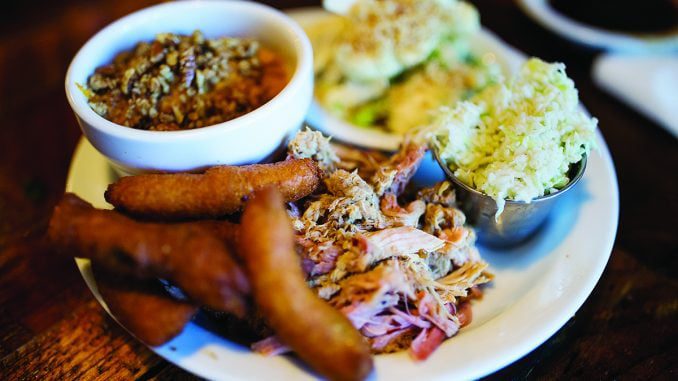
DURHAM — Wearing knee-high rubber boots, barbecue man Wyatt Dickson stands alongside farmer Ryan Butler in a pasture filled with hogs, some big, some small, some rooting for food from the earth, others wallowing in a mud hole.”This here is pigvana,” says Butler with a smile.

Along with Chef Ben Adams, Dickson and Butler are partners of the newly opened Picnic restaurant in Durham, where Dickson’s whole-hog pork cooked over hardwood coals for 18 to 24 hours pairs with Adams’ deftly fried chicken and sides. Ryan Butler and his wife, Alicia, own Green Button Farm, Picnic’s pig supplier.Some of the pastures here are planted with kale and turnips. Others, rye or millet. “They move from pasture to pasture seasonally,” Butler explains. “This not only feeds them well, but also gives the land a chance to recover.”
One grazing ground is a natural oak grove. When brisk temps usher acorns off the limbs, the pigs feast. “The pork in November and December is the best of the year,” says Butler. “They’re eating acorns, pumpkins, butternut squash, apples all the fall seasonal things we like to eat, they like too. And you can change the flavor of pork in about 30 days.”A couple of times a week, the pigs get a special treat in the form of spent brewer’s grain from Durham’s Ponysaurus Brewing Company. “A virtuous circle,” notes Dickson.
The farm, which recently entered conservation status via the Triangle Land Conservancy, sits on 38 acres in rural Bahama (pronounced Bah-HAY-ma), 12 miles north of downtown Durham. In five short weeks, the bucolic landscape will swell with wanderlusting foodies and barbecue royalty as the first-ever North Carolina Barbecue Revival kicks off here on Oct. 28.
Eastern North Carolina barbecue was born of whole hogs and hot hardwood coals. Today, although barbecue establishments proliferate across the state, few adhere to this original method. Even fewer source hogs straight from the farm. Instead, pits have come to house shoulders instead of whole hogs, and electricity and gas have replaced or come to the aid of real wood.
“Fifty years ago, all pig farms looked something like this,” says Dickson, extending an arm across the horizon at Green Button Farm. “As the growing practices changed, and the pigs were bred to grow faster with less feed, it dramatically affected the quality of pig, and thus the quality of the barbecue. What I have the opportunity to do is show people how much better barbecue can be.”

At age 35, Dickson is among the next generation of barbecue masters a growing legion that includes Elliott Moss of Asheville’s Buxton Hall, John Lewis of Lewis Barbecue in Charleston, Bryan Furman of B’s Cracklin’ in Savannah, Tyson Ho of Arrogant Swine of New York City, and Sam Jones, the sixth-generation pitmaster of Skylight Inn in Ayden and Sam Jones BBQ in Winterville. All will be in attendance at the Barbecue Revival, a series of events unfolding Oct. 28, 29, and 30 that range from a high-dollar private dinner to a head-to-tail butchery class.
Dickson, Jones and Moss will cook whole hogs overnight to prepare for Sunday’s family friendly pig pickin’, complete with bluegrass band, hayrides and a pie auction.
Barbecue is a passion-fueled food, and arguments will persist over sauce, pulling, chopping, the size of the hog and how long it should cook. But one thing this new wave of barbecue diehards agree on? It’s got to be whole hog, and it’s got to be cooked over wood.
“Barbecue is sacred to the people of North Carolina,” says Dickson. “If you’re going to do this, you have an obligation to be a good steward of our state cuisine. I can’t think of a better way to do it than this.”



